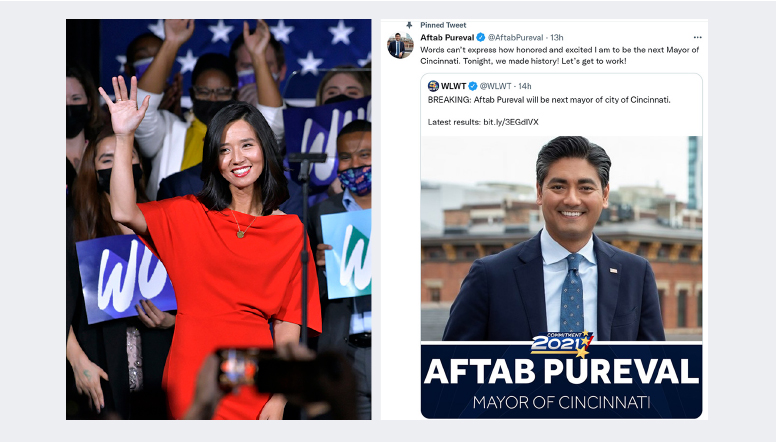
Boston voters for the first time elected a woman and an Asian American as mayor on Nov. 2, tapping City Councilor Michelle Wu to serve in the city’s top political office.
And in Cincinnati, former lawyer Aftab Pureval easily defeated David Mann—also becoming the first Asian American elected to lead that city.
“Tonight, we made history in Cincinnati,” Pureval told a large gathering of supporters.
“Cincinnati is a place where no matter what you look like, where you’re from, or how much money you have, if you come here and work hard, you can achieve your dreams.”

Cincinnati Mayor-elect Aftab Pureval (Aftab Puerval’s Twitter post)
A son of immigrants, the half-Indian, half-Tibetan Pureval is viewed as a rising political star in the state. He was elected clerk of courts in 2016 after running ads with a stuffed duck quacking his name—“Aftab!”—in a campaign reminiscent of the old Aflac insurance commercials.
Wu beat fellow city councilor Annissa Essaibi George, an Arab Polish American. Wu, who is Taiwanese American, was the favorite especially after getting a coveted endorsement from acting mayor Kim Janey, who was elevated to the post when the former mayor resigned.
In a victory speech at her Election Night party, Wu said, “From every corner of our city, Boston has spoken. We are ready to meet this moment. We are ready to become a Boston for everyone.”

Boston Mayor-elect Michelle Wu greets supporters at her election night on Nov. 2. (AP Photo/Josh Reynolds)
Wu was first elected to the City Council in 2013 at age 28, becoming the first Asian American woman to serve on the council. In 2016, she became the first woman of color to serve as council president.
High-profile mayors who are Asian American and Pacific Islander (AAPI) have typically been elected in places with historically large Asian populations like California and Hawaii. These candidacies signal just how large the AAPI electorate has multiplied with more feeling empowered to be a voice in the political fray.
The AAPI Victory Fund, a Super PAC that mobilizes eligible Asian American and Pacific Islander voters and candidates, endorsed Pureval and Wu. Shekar Narasimhan, AAPI Victory Fund founder and chairman, called Wu’s and Pureval’s wins a triumph not just for the candidates, but for the AAPI community nationwide.
“It is more important than ever to elect diverse leadership across local, state, and federal governments, and Aftab will bring his unique experience to lead Cincinnati toward a more equitable, inclusive, and just city.”
AAPI Victory Fund had named Wu as one of its “Rising Stars” earlier this year.
Narasimhan said, “With Michelle Wu at the helm, Boston will become more inclusive, more equitable, and its representatives more diverse. We at AAPI Victory Fund are hopeful that her history-shaping win will empower the next generation of AAPI leaders to aim high, dream big, and believe that the power to enact change is well within reach, regardless of religion, ethnicity, or gender.”
The Reflective Democracy Campaign, which looks at diversity in political leadership, recently released a study that found AAPIs make up over 6% of the U.S. population, but less than 1% of elected offices.
James Lai, an ethnic studies professor at Santa Clara University whose specialties include Asian American and urban politics, said these mayoral races are a “beautiful” microcosm of how Asian Americans are a growing political force.
AAPI Victory Fund President Varun Nikore believes the pandemic-sparked racism that pushed AAPI voter turnout in the 2020 election will continue. Candidate wins will also dispel stereotypes that Asians don’t “belong,” he added.
Pureval confronts the foreigner stereotypes head-on, often introducing himself as “a brown dude with a funny name.” Perceived political liabilities like ethnicity can be strengths, too, he said.
“I’m hopeful that one day when we elect more and more AAPIs to office, future AAPI candidates won’t have to think through that.”



